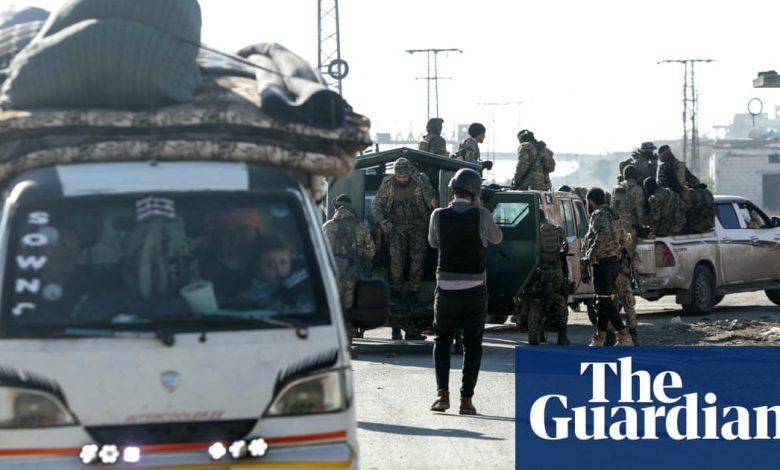Iran’s top diplomat to visit Damascus as Syria’s allies rally after fall of Aleppo | Syria

Iran’s top diplomat is expected to go to Damascus in a show of support for the Syrian regime as it tries to fend off the strongest challenge to its rule in years after a sudden Islamist insurgent offensive that saw it seize control of Aleppo.
Iranian Foreign Minister Abbas Araghchi told reporters he would travel to Syria on Sunday to convey the strength of Tehran’s support for Bashar al-Assad and its management. Aragchi is expected in the Turkish capital Ankara the next day as Damascus’ allies and opponents struggle to adjust to Assad’s sudden losses in northern Syria.
“We firmly support the Syrian army and government,” he said, according to the official IRNA news agency. It came as a wave of Syrian and Russian airstrikes hit opposition-held areas. Idlib’s civil defense forces, known as the White Helmets, said an airstrike on the city of Idlib killed four people and wounded 54 others.
Assad has been conspicuously absent from the public eye for several days amid a surprise offensive led by Hayat Tahrir al-Sham (HTS) Islamist fighters that swept through towns and villages in northwestern Syria in less than a week before taking control of Aleppo. the second largest city in the country and a former industrial center.
The embattled Syrian leader re-emerged late on Saturday night to hold a flurry of talks with regional allies in Baghdad and Abu Dhabi, as forces loyal to Damascus appeared to mount a counterattack. Assad told Emirati President Mohammed bin Zayed al-Nahyan that the Syrian government “is capable, with the help of its allies and friends,” of repelling the sudden uprising.
The regime in Damascus has long relied on foreign support, especially during the 2016 battle. to regain control of Aleppo, where Russian air power proved decisive. The Syrian government also relies heavily on Iranian forces on the ground, including members of the Iranian Revolutionary Guard. Israel has rapidly increased airstrikes against Iranian targets in Syria over the past year amid growing regional confrontations with Tehran and its backers.
Assad crushed a popular uprising against him in 2011 before it erupted into a bloody civil war that eroded his control over the country and left him heavily dependent on support from Tehran and Moscow. The Syrian leader has also used airstrikes, siege tactics and chemical weapons against his own people during fierce battles to regain control of the territory.
The sudden loss of Aleppo to Islamist fighters appears to have rattled Assad’s supporters abroad. In a phone call Saturday between Russian Foreign Minister Sergey Lavrov and Aragchi, both “expressed extreme concern about the dangerous escalation in Syria.”
Araghchi blamed the US and Israel for Islamist militants’ sudden territorial gains in northwestern Syria with his Syrian counterpart on Friday, claiming they were behind the advance.
The militants’ huge territorial gains have raised questions about the Syrian army’s ability to respond, while its backers have deployed resources elsewhere, with Russian forces more focused on the fight in Ukraine.
The advance also sparked a flurry of regional diplomacy, with Jordanian Foreign Minister Ayman Safadi speaking to his Syrian counterpart to express “Jordan’s concern about the unfolding events” while advocating for a political solution in Syria.
Turkish Foreign Minister Hakan Fidan discussed the events in Syria with his Iraqi counterpart Fuad Hussein, Turkish media reported. Officials in Ankara, who support select elements of the Syrian armed opposition, recently proposed normalizing relations with Damascus after regional leaders who once shunned Assad began to welcome him back into the fold.
US National Security Council spokesman Sean Savet said on Saturday evening that Washington was “closely monitoring the situation in Syria and has been in contact with regional capitals over the last 48 hours”.
The Assad regime’s reliance on Russian and Iranian support created the current instability, he said, “including the collapse of the Assad regime’s lines in northwestern Syria.” He added that “the United States has nothing to do with this offensive,” pointing out that HTS had previously been designated a terrorist organization.
Across northern Syria, Turkish-backed Syrian rebel groups and Kurdish militias moved to claim territory quickly evacuated by forces loyal to Damascus as Syrian government forces retreated from areas they had held for nearly a decade.
At Kuweires Air Base, east of Aleppo, video shows Turkish-backed Syrian rebel forces taking control of the base and weapons there, including an Iranian-made drone.
As the rebels pushed south towards the city of Hama, a concerted counterattack by the Syrian army appeared to be looming. Damascus’ state news agency and pro-government channels shared images purporting to show business as usual in Hama itself, with civilians crossing busy streets and visiting local markets with piles of vegetables, as well as a tour by local police forces.
Syria’s defense ministry said it had reinforced defense lines in northern Hama to repel a militant advance, after previously promising a counterattack “to restore all regions”, while rebel forces described fierce fighting in the area north of the city Hama.



